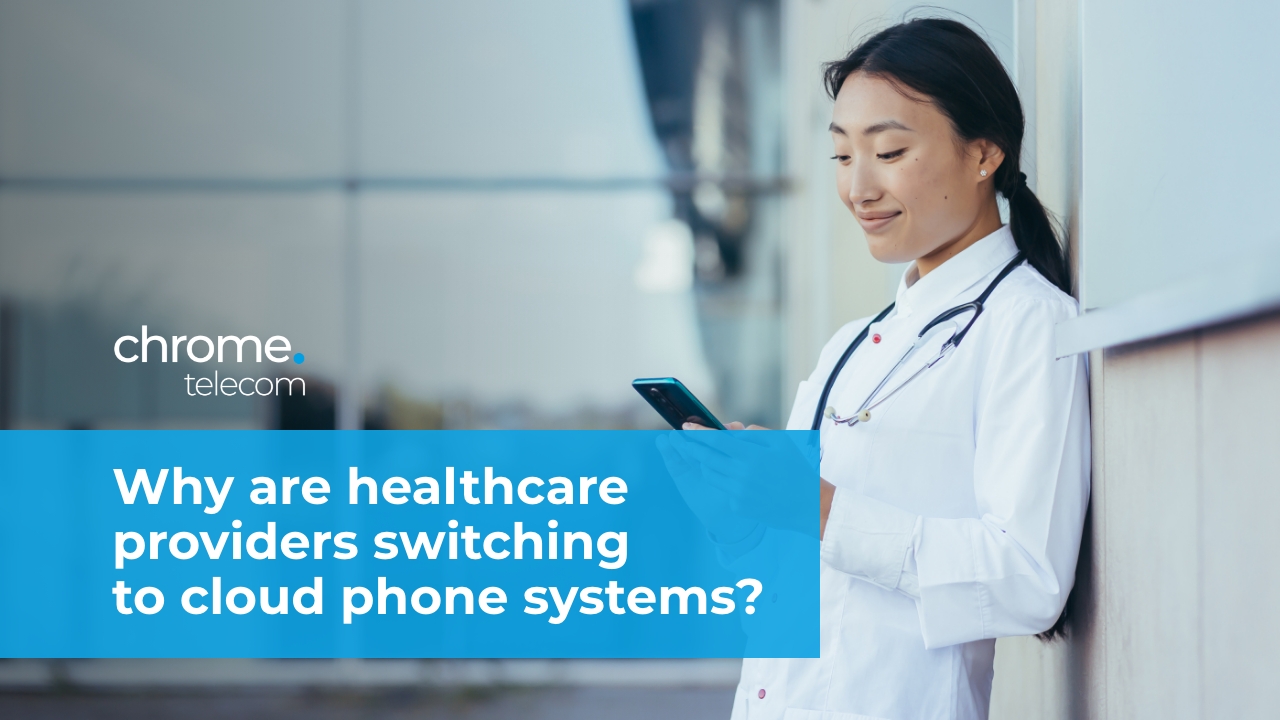Increasingly, healthcare providers are making the switch to a cloud-based phone system. We set out the challenges facing healthcare providers and the reasons why they’re making the switch.
What is a cloud-based phone system?
A cloud-based phone system is a telephone system that is hosted and managed remotely by a third-party provider. Instead of having a physical telephone system installed on-premises, users connect to the phone system through the internet.
Cloud-based phones allow for a flexible and scalable solution which is perfect for healthcare providers who have multiple phone lines and high call volumes. Some common features of cloud-based phone systems include call routing, voicemail, call recording, and automatic call distribution. All these features contribute to streamlining communications which positively impact patient and staff communication.
Why are healthcare providers switching to a Cloud-based phone system?
There are several reasons why healthcare providers are making the switch. One of the main reasons is that they are more flexible and scalable than traditional on-premises phone systems. This allows healthcare providers to easily add or remove phone users as needed.
Another reason for the switch is that cloud-based systems offer advanced features that are not typically available with traditional phone systems. By switching to the Cloud, systems can be easily accessed and monitored remotely, which is beneficial if any staff are working off site.
Cloud-based phone systems offer cost savings to healthcare providers. Since there is no need to purchase and maintain expensive hardware, the costs are spread out over time through a subscription model. This can be a more cost-effective solution in the long run.
Cloud-based systems can also increase reliability and security. They are generally more secure than traditional phone systems as they offer automatic software updates, offsite backups and the security protocols can be regularly updated.
Healthcare providers need a good communication system, here’s why.
Building trust and a positive therapeutic relationship between patients and healthcare providers is essential for improving patient outcomes and satisfaction. Having a good communication system is essential in facilitating this.
One of the main reasons to switch to a cloud-based system is that it allows for efficient and accurate communication between healthcare staff and patients, which is critical for providing safe and high-quality patient care.
In emergency situations, you need reliable communication technologies. Efficient communication is needed between healthcare providers and their patients to ensure that patients fully understand their condition, treatment plan, and any potential risks or side effects.
What are the challenges healthcare providers are facing with their current phone systems?
Chrome Telecom are experienced in supporting healthcare providers with cloud-based phone systems. Because of this we understand the challenges they are facing with their current systems. Here are the main challenges we have witnessed working with healthcare providers.
- A limited number of lines
Patients being able to get in contact with their healthcare providers is a big issue. The combination of high call volume, staff availability and the number of phone lines all contribute to the ongoing problem.
- Unreliable phone systems
A phone system that’s nearing the end of its life (and depending on the age of the model may no longer be supported by the manufacturer) runs the risk of a system failing. It’s important for healthcare providers to protect their practices and avoid downtime and stress by upgrading their systems.
- Customer service is effected by an old phone system.
Based on the last two challenges, not being able to handle the number of calls, or relying on a system which is outdated and slow, will negatively impact patients and potentially their care.
By upgrading, patient satisfaction could improve when communication is streamlined.
So, how do cloud phone system features help healthcare providers?
Now we’ve looked at the challenges, let’s look at how they can be addressed through the features of cloud phone systems.
- Scalability
Cloud-based phone systems can be scaled up or down as the needs of the healthcare provider change. This is especially important for healthcare providers that are rapidly expanding or downsizing.
- Flexibility
With a cloud-based phone system, healthcare providers can have the same features and functionality of a traditional phone system without the need for expensive on-premises hardware. This allows them to be more flexible and responsive to changing needs.
- Remote access
Cloud-based phone systems allow healthcare providers to easily access their networks from anywhere. This is important for healthcare providers with remote staff or those who need to access patient information from outside the office.
- Cost-effectiveness
Cloud-based phone systems can be more cost-effective, especially for providers that have multiple locations or many staff.
- Security
They offer superior security features such as encryption and automatic software updates, helping providers meet the appropriate compliance and regulations for the healthcare industry, and ultimately protect patient data.
- Integration with other systems
Electronic Health Records (EHRs) can be integrated with cloud-based phone systems. This integration can help healthcare providers streamline workflow, reduce human error, and improve patient care.
- Advanced Features
Cloud-based phone systems can offer additional advanced features such as automated call routing, call recording, and integration with CRM. This can help healthcare providers improve patient care and customer service.
- Business Continuity
Cloud-based phone systems are less likely to be affected by natural disasters or power outages, which can help keep providers in contact with patients even in an emergency.
Switch to cloud-based phone systems
Overall, healthcare providers are switching to cloud-based phone systems for many reasons, including greater flexibility, advanced features, cost savings, as well as improved security and reliability. The cloud phone system allows them to have effective communication with patients, which is essential as it enables them to provide safe, high-quality care.
If you’re a healthcare provider and believe your practice could use an upgrade to your phone systems, get in touch!

